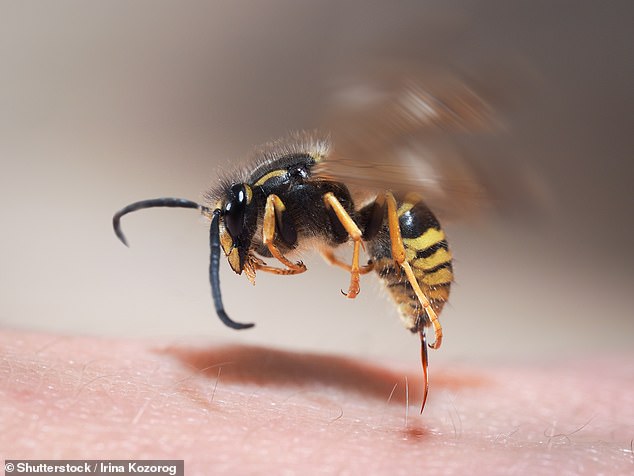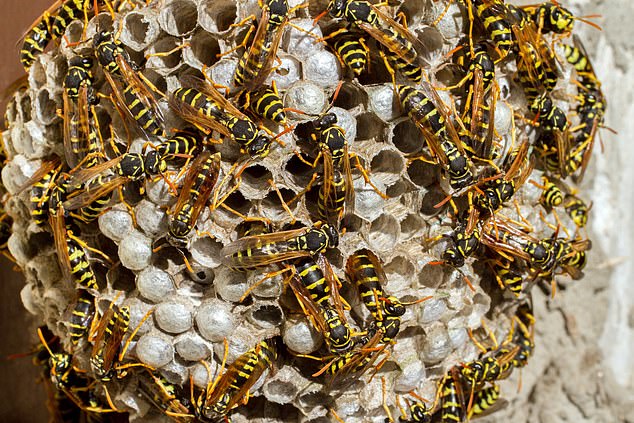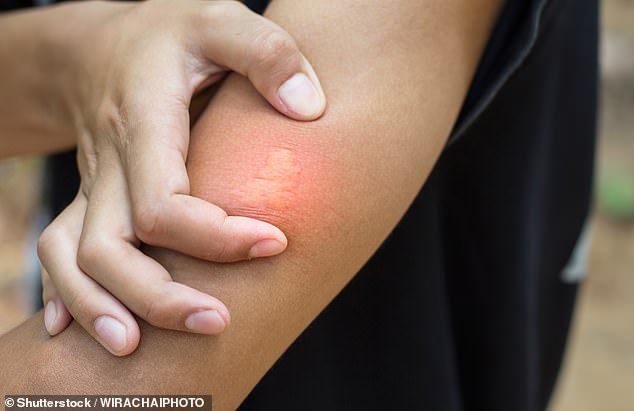The UK is in the midst of one of its hottest summers on record, with multiple heatwaves throughout June and July.
Now, a pest control expert has revealed an unexpected side–effect of this balmy weather.
Laurence Edwards, a leading beekeeper and entomologist, has warned that wasps are attacking far earlier than normal this year.
Usually, wasps are most aggressive in the late–autumn.
However, this year’s hot spring and summer have created perfect nesting conditions, and colonies have ‘exploded’ in size far earlier than normal.
Mr Edwards called this a ‘perfect swarm’ of environmental factors.
‘It’s a perfect swarm and it means that everyone should be on the lookout – both for their own safety and that of other insects, such as bees,’ he explained.
The wasp’s sting is designed as a self–defence mechanism but, unlike bees, wasps can sting multiple times.

Laurence Edwards, a leading beekeeper and entomologist, has warned that wasps are attacking far earlier than normal this year

Usually, wasps are most aggressive in the late–autumn. However, this year’s hot summer has created perfect nesting conditions, and colonies have ‘exploded’ in size far earlier than normal
Wasps have a bad reputation for being aggressive, but their behaviour actually fluctuates with the seasons.
Usually, the queen wasps emerge from hibernation between late March and late April, before laying their first eggs in May.
Her offspring will be new drones and worker wasps, who become most active in June and July.
But by August and September, wasps begin to turn a little more nasty.
The queen wasps will be leaving the nest to find new hibernation spots, leaving the workers without a nest.
As they become more desperate, the wasps begin to roam – and sting people more.
The aggression usually continues through until early October, while the arrival of cold weather generally triggers the end of the cycle for all but the queens.
However, a lot depends on the weather.

The sting is designed as a self–defence mechanism but, unlike bees, wasps can sting multiple times (stock image)
As spring serves as the trigger for insects to become more active, the early hot weather this year meant that the wasps hit their peak prematurely this year.
So, instead of the wasps turning nasty in August and September, they’re already getting more aggressive.
Wasps tend to sting when they become angry or scared.
As anyone who has experienced one will know, their stings can be painful – but thankfully most people recover quickly and without complications.
‘There’s a lot you can do to mitigate the risk of wasp attacks, saving yourself from painful stings and ensuring wasps don’t attack, or even destroy, any nearby bee colonies,’ Mr Edwards reassured.
The expert, who runs Black Mountain Honey, recommends growing wasp–repelling plants such as mint, eucalyptus, lemongrass or thyme.
In addition, he encourages you to keep natural predators in your garden, such as birds and spiders.
Meanwhile, it’s best to cover food and compost, as these will only attract wasps.
‘Keep bins tightly sealed. Rinse out recyclables,’ Mr Edwards added.
‘Don’t leave scraps, pet food, or ripe fruit exposed.’
If you are stung, make sure you wash the area with soap and water, before applying a cold compress for 10–20 minutes.
You can also take paracetamol or ibuprofen to reduce pain and swelling.






